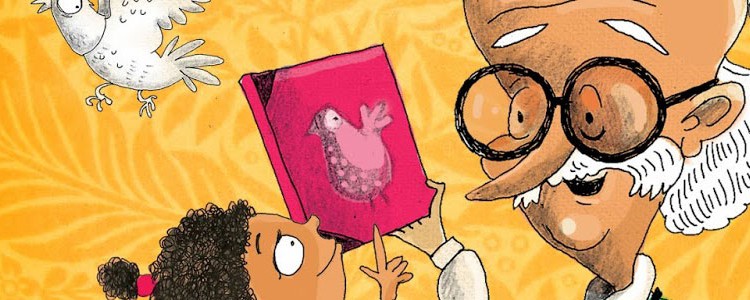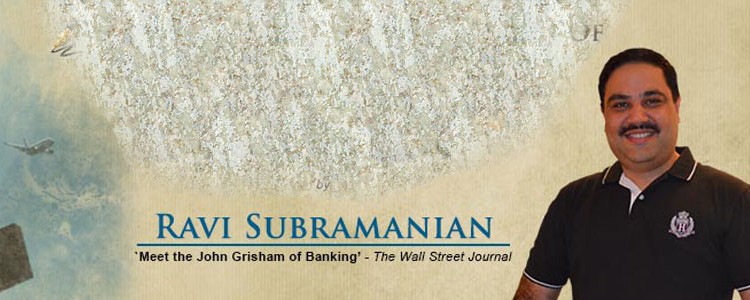
I read Ravi Subramanian’s Bankerupt recently. I enjoyed the story. It was a well-paced thriller, the intricacies of the financial world come through well. The understanding of a Ponzi scheme involving Emus was fascinating. ( In Erode there was such a scheme that collapsed. Read more: http://www.businessworld.in/en/storypage/-/bw/greed-lured-even-literate-investors-into-emu-scam-rbi/r1017752.0/page/0) Other aspects in Bankerupt like the long-distance relationship, trying to keep their marriage alive, the stresses of an academic and the NRA were well-researched. No wonder Ravi Subramanian has won the Crossword Book Award ( Popular Vote) two years in a row: Bankster in 2012 and The Incredible Banker in 2011.
He is an alumnus of Indian Institute of Management (Bangalore), currently head of a leading financial institution. A career banker and financial services professional, Ravi has worked with various multinational banks (Citibank, ANZ Grindlays Bank and HSBC) for over eighteen years. As a result of his extensive background in foreign banks, writing about banking comes quite naturally to Ravi. Each one of his books thus far have been set in the backdrop of a foreign bank. His six bestselling books: If God was a Banker (2007), Devil in Pinstripes (2009), The Incredible Banker (2011), The Bankster (2012), Bankerupt (2013) and I Bought the Monks Ferrari (2007).

Trophies for the Crossword Book Award (Popular vote) won in 2010 and 2011
In June 2013 he moved publishers to join Penguin India, now Penguin Random. He signed a signed a two-book deal worth an estimated Rs 1.25 crore (approx $210,700 at the time). https://www.jayabhattacharjirose.com/jaya/2013/06/30/good-lit-versus-saleable-lit-pubspeak-june-2013/
How much research do you put in for each novel?
It depends. For parts of the plot which are in the banking domain, I don’t need to do much of a research. Just a couple of phone calls in case of a doubt. However for other aspects, I need to do fair bit of research. For example, in Bankerupt, I have talked in detail about the pitched battle between Gun Activists and the Gun Lobby in the United States. I read three books and read a research paper, to understand both perspectives and formulate my own opinion. Bankerupt was also set in MIT, Boston. To understand academia and lives of people working in this field, I spoke to multiple professors and research associates in the US. While one has the creative license while writing fiction, one needs to make sure that fundamental errors in plotting don’t creep in.
How do you work out the story drafts? Do you create each character beforehand and then tuck in details into the novel?
None of my stories or characters have been created beforehand and tucked into the novel. I always start with a canvas – a backdrop. And then keep adding elements. For example, the story of Bankerupt came out of a meeting with a MIT professor who had come to present to me a credit underwriting model. We got talking about life in the US in general and academia in specific. The moment the meeting got over, I knew that I had a backdrop for my story – the Academia in USA. Every element came thereafter.
I start the first chapter with the backdrop in mind. The first leads to the next, then the next and thereon the story continues. Characters are built along the way. This method of writing makes me rewrite many parts of the novel, but then it gives me one great benefit : IF I don’t know what the next page contains, there is some hope in hell that the reader will be able to predict what will happen. It helps me build intrigue and thrill in the novel.
Do you edit as you go along or only after completing the first draft?
Only the part that I need to change to make progress on my story, I edit as I go along. Else I don’t edit while writing. I complete the first draft (and the story) and then edit the entire manuscript. A number of changes creep in while editing – at times even the plot undergoes a tweak.
Do you take inputs from friends and editors to see how the story is improving?
Not while I am writing it. I talk to my daughter and my wife. Take their inputs while I write. But that’s it. I don’t share my manuscript till its complete.
Having said that, I do share my complete manuscript with a few people once its complete. This is a trusted core group of people who read it and come back with their feedback. If they recommend a change, and I am convinced about the change, I don’t mind tweaking the manuscript to incorporate that change.
How do you keep an eye on so much detail? Do you make an excel sheet of each character and situation or do you prefer working in longhand first?
It is not as complex as it sounds. I have a drawing book, which I use at every stage, to think and sketch a elementary storyboard of the next chapter, or maximum tow chapters at a time.
How do you tie up the loose ends ? Does it happen as you envision it will or do the characters also lead you along various ways?
I think it is a highly romanticized term which authors use to overcomplicate a simple process of writing a book. I don’t think any character will go where the author does not want him or her to go. I consider all the options, all the possibilities that can happen and then try and take the most shocking of them. And the characters do what it takes to drive the story in that direction.
Yes sometimes tying loose ends becomes a challenge. But when you write a thriller, you need to make sure that the pace is such that the reader is more curious about what happens next than worry about why a particular character did what he or she did. I normally use the last couple of chapters to tie in all the loose ends. A narrative style of writing helps me in this.
Do you read and read and read thrillers or do you not wish to be distracted while writing?
I do read, even when I am writing. Sometimes, when I am indecisive about which direction to take, it helps immensely if I take my mind of and read. Thinking about the problem on hand, after a break invariably solves it for me.
How long does it take you to write one book?
Eight to nine months. Given that I want to bring out a book a year, at the least, this pace is necessary.
How many drafts do you have in making now? Are you stocked up well on drafts for the next few years?
Haha.. how I wish!!! No. While I have lots of stories inside me, I don’t have draft or outlines. Because each of the story in my mind, can be strewn into a novel in ten different ways. And that clarity will only come if I sit down to pen the story. I have one complete manuscript, which is a story of three generations of south Indians which I will bring out sometime in the future.
Where do you find your stories?
All around. In people, in conversations, while driving, while attending social engagements, reading…. There is a story everywhere. You just have to spot it.
How do you determine the length of your chapters?
I consciously try to keep my chapters short. This is something which I have leant over the years. Short chapters help the reader complete more chapters while reading at night, helps keep the intrigue factor high, and increases the pace of the book. 3-4 pages of a book per chapter is good. 5-6 is acceptable. And more than six is avoidable. Bankerupt has 77 chapters in 320 pages.
What is an ordinary day in the life of Ravi S as a writer?
I lead a very normal life. Get up at 6.45am. After the mandatory filter coffee, three newspapers, I wake up my daughter. I love the five to ten minutes that I spend in waking her up. The two minute sleep extensions drop to 1 minute and then to 30 secs and then the “Get up now… or you will be late for school”, is fun. I help my wife with work in the morning. We are a working couple, so time is at a premium. I drop my daughter to school and head to work. Am early at work. Getting in early gives you the luxury of leaving early. I get back home by 6.30. Half an hour at the treadmill, a bit of loafing around and its time for dinner. I sit down to write post dinner and often write till 12.30 or 1.00. That’s the time I try an respond to mails, feedback etc. I sleep late. Once in a while I sleep for a few extra hours on Saturday and Sunday and make up for it. It helps that I don’t have to sit in a secluded place with birds chirping and rain drops falling on the window to focus on writing. I can do that pretty much sitting in the midst of constantly chattering people.







